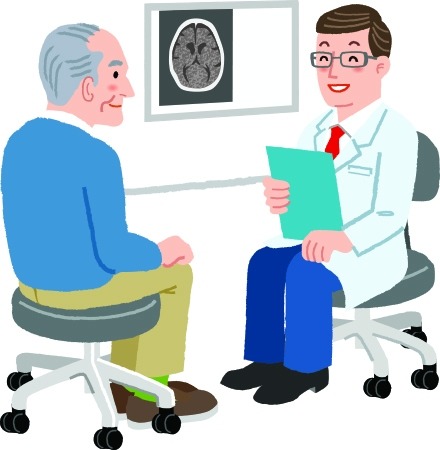To screen, or not to screen (for dementia), that is still the question

A leading group of medical experts on Tuesday declined to endorse cognitive screening for older adults, fueling a debate that has simmered for years.
The U.S. Preventive Services Task Force said it could neither recommend nor oppose cognitive screening, citing insufficient scientific evidence of the practice’s benefits and harms and calling for further studies.
The task force’s work informs policies set by Medicare and private insurers. Its recommendations, an accompanying scientific statement and two editorials were published Tuesday in the Journal of the American Medical Association.
The task force’s new position comes as concern mounts over a rising tide of older adults with Alzheimer’s disease and other dementias and treatments remain elusive. Nearly 6 million Americans have Alzheimer’s disease; that population is expected to swell to nearly 14 million by 2050.
Because seniors are at higher risk of cognitive impairment, proponents say screening ? testing people without any symptoms — is an important strategy to identify people with unrecognized difficulties and potentially lead to better care.
“This can start a discussion with your doctor: ‘You know, you’re having problems with your cognition, let’s follow this up,’” said Stephen Rao of Cleveland Clinic’s Lou Ruvo Center for Brain Health.
Opponents say the benefits of screening are unproven and the potential for harm is worrisome. “Getting a positive result can make someone wary about their cognition and memory for the rest of their life,” said Benjamin Bensadon, an associate professor of geriatric medicine at the University of Florida College of Medicine.
The task force’s stance is controversial, given how poorly the health care system serves seniors with memory and thinking problems. Physicians routinely overlook cognitive impairment and dementia in older patients, failing to recognize these conditions at least 50% of the time, according to several studies.
When the Alzheimer’s Association surveyed 1,954 seniors in December 2018, 82% said they thought it was important to have their thinking or memory checked. But only 16% said physicians regularly checked their cognition.
What’s more, Medicare policies appear to affirm the value of screening. Since 2011, Medicare has required that physicians assess a patient’s cognition during an annual wellness visit. But only 19% of seniors took advantage of this voluntary benefit in 2016, the most recent year for which data is available.
Dr. Ronald Petersen, co-author of an editorial accompanying the recommendations, cautioned that they shouldn’t discourage physicians from evaluating older patients’ memory and thinking.
“There is increased awareness, both on the part of patients and physicians, of the importance of cognitive impairment,” said Petersen, director of the Mayo Clinic’s Alzheimer’s Disease Research Center. “It would be a mistake if physicians didn’t pay more attention to cognition and consider screening on a case-by-case basis.”
Similarly, seniors shouldn’t avoid addressing worrisome symptoms.
“If someone has concerns or a family member has concerns about their memory or cognitive abilities, they should certainly discuss that with their clinician,” said Dr. Douglas Owens, chair of the task force and a professor at Stanford University School of Medicine.
In more than a dozen interviews, experts teased out complexities surrounding this topic. Here’s what they told me:
Screening basics. Cognitive screening involves administering short tests (usually five minutes or less) to people without any symptoms of cognitive decline. It’s an effort to bring to light problems with thinking and memory that otherwise might escape attention.
Depending on the test, people may be asked to recall words, draw a clock face, name the date, spell a word backward, relate a recent news event or sort items into different categories, among other tasks. Common tests include the Mini-Cog, the Memory Impairment Screen, the General Practitioner Assessment of Cognition and the Mini-Mental Status Examination.
The task force’s evaluation focuses on “universal screening”: whether all adults age 65 and older without symptoms should be given tests to assess their cognition. It found a lack of high-quality scientific evidence that this practice would improve older adults’ quality of life, ensure that they get better care or positively affect other outcomes such as caregivers’ efficacy and well-being.
A disappointing study. High hopes had rested on a study by researchers at Indiana University, published in December. In that trial, 1,723 older adults were screened for cognitive impairment, while 1,693 were not.
A year later, seniors in the screening group were not more depressed or anxious — important evidence of the lack of harm from the assessment. But the study failed to find evidence that people screened had a better health-related quality of life or lower rates of hospitalizations or emergency department visits.
Two-thirds of seniors who tested positive for cognitive impairment in her study declined to undergo further evaluation. That’s consistent with findings from other studies, and it testifies to “how many people are terrified of dementia,” said Dr. Timothy Holden, an assistant professor at Washington University School of Medicine in St. Louis.
“What seems clear is that screening in and of itself doesn’t yield benefits unless it’s accompanied by appropriate diagnostic follow-up and care,” said Nicole Fowler, associate director of the Center for Aging Research at Indiana University’s Regenstrief Institute.
Selective screening. “Selective screening” for cognitive impairment is an alternative to universal screening and has gained support.
In a statement published last fall, the American Academy of Neurology recommended that all patients 65 and older seen by neurologists get yearly cognitive health assessments. Also, the American Diabetes Association recommends that all adults with diabetes age 65 and older be screened for cognitive impairment at an initial visit and annually thereafter “as appropriate.” And the American College of Surgeons now recommends screening older adults for cognitive impairment before surgery.
Why test select groups? Many patients with diabetes or neurological conditions have overlapping cognitive symptoms and “it’s important to know if a patient is having trouble remembering what the doctor said,” said Dr. Norman Foster, chair of the workgroup that developed the neurology statement and a professor of neurology at the University of Utah.
Physicians may need to alter treatment regimens for older adults with cognitive impairment or work more closely with family members. “If someone needs to manage their own care, it’s important to know if they can do that reliably,” Foster said.
With surgery, older patients who have preexisting cognitive impairments are at higher risk of developing delirium, an acute, sudden-onset brain disorder. Identifying these patients can alert medical staff to this risk, which can be prevented or mitigated with appropriate medical attention.
Also, people who learn they have early-stage cognitive impairment can be connected with community resources and take steps to plan for their future, medically and financially. The hope is that, one day, medical treatments will be able to halt or slow the progression of dementia. But treatments currently available don’t fulfill that promise.
Steps after screening. Screening shouldn’t be confused with diagnosis: All these short tests can do is signal potential problems.
If results indicate reason for concern, a physician should ask knowledgeable family members or friends what’s going on with an older patient. “Are they depressed? Having problems taking care of themselves? Asking the same question repeatedly?” said Dr. David Reuben, chief of geriatrics at UCLA’s David Geffen School of Medicine and director of UCLA’s Alzheimer’s and Dementia Care program.
A comprehensive history and physical examination should then be undertaken to rule out potential reversible causes of cognitive difficulties, implicated in about 10% of cases. These include sleep apnea, depression, hearing or vision loss, vitamin B12 or folic acid deficiencies, alcohol abuse and side effects from anticholinergic drugs or other medications, among other conditions.
Once other causes are ruled out, neuropsychological tests can help establish a diagnosis.
“If I detect mild cognitive impairment, the first thing I’ll do is tell a patient I don’t have any drugs for that but I can help you compensate for deficits,” Reuben said. The good news, he said: A substantial number of patients with MCI ? about 50% — don’t develop dementia within five years of being diagnosed.
The bottom line. “If you’re concerned about your memory or thinking, ask your physician for an assessment,” said Dr. David Knopman, a neurologist at the Mayo Clinic. If that test indicates reason for concern, make sure you get appropriate follow-up.
That’s easier said than done if you want to see a dementia specialist, noted Dr. Soo Borson, a professor emerita of psychiatry at the University of Washington. “Everyone I know who’s doing clinical dementia care says they have wait lists of four to six months,” she said.
With shortages of geriatric psychiatrists, geriatricians, neuropsychologists and neurologists, there aren’t enough specialists to handle demands that would arise if universal screening for cognitive impairment were implemented, Borson warned.
If you’re a family member of an older adult who’s resisting getting tested, “reach out privately to your primary care physician and express your concerns,” said Holden of Washington University. “And let your doctor know if the person isn’t seeing these changes or is resistant to talk about it.”
This happens frequently because people with cognitive impairments are often unaware of their problems. “But there are ways that we, as physicians, can work around that,” Holden said. “If a physician handles the situation with sensitivity and takes things one step at a time, you can build trust and that can make things much easier.”
 Kaiser Health News (KHN) is a national health policy news service. It is an editorially independent program of the Henry J. Kaiser Family Foundation, which is not affiliated with Kaiser Permanente.
Kaiser Health News (KHN) is a national health policy news service. It is an editorially independent program of the Henry J. Kaiser Family Foundation, which is not affiliated with Kaiser Permanente.
In the column “Navigating Aging,” KHN contributing columnist Judith Graham focuses on medical issues and advice associated with aging and end-of-life care, helping America’s 45 million seniors and their families navigate the health care system.
News in Context:
- The National Health Service (NHS) in the UK considers adding a 5‑minute cognitive test to its annual health check-up
- The FDA clears two computerized cognitive tests to assist in medical evaluations following brain injury or concussion
- Solving the Brain Fitness Puzzle Is the Key to Self-Empowered Aging
- Report: 35% of worldwide dementia cases could be prevented by modifying these 9 modifiable risk factors
- Study challenges the “seductive” amyloid hypothesis of Alzheimer’s disease (AD)


